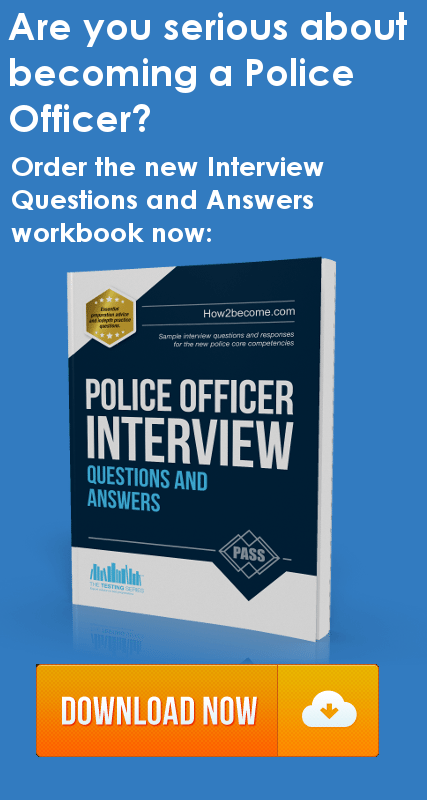As of August 2015 the college of policing in the UK amended the police officer recruitment interview question format. This article provides candidates with details information and advice on how to prepare effectively for the new format, which includes both motivational and value based questions, in addition to the past behaviour questions.

The new style questions are still based on the important police constable competencies, which include the following:
• Service Delivery
• Decision Making
• Serving The Public
• Professionalism
• Openness To Change
• Working With Others
It is also important to stress that all candidates who embark on the UK police recruitment assessment centre process will also be assessed in the area of ORAL COMMUNICATION.
The interview, as previously discussed, will last for no longer than 20 minutes, during which time there will be four questions asked.
Unlike the previous set of competency-based police interview questions, the new format means multiple competencies will be assessed during every single question.
Another element of the new police officer interview questions, which differs from the old interview format, is that applicants will not normally be told which competency they are being assessed against. This, therefore, means the potential recruit needs to be fully conversed in the meaning and application of each of the six core competencies.
MOTIVATIONS AND VALUES POLICE OFFICER ASSESSMENT INTERVIEW QUESTIONS
There will be two questions based on this subject and format, and they could include:
Q. What values do you think a police officer should possess?
Q. Why do you want to become a police officer?
Q. What has attracted to the police force?
Q. What does the role of a constable involve?
Q. What is the mission and goals of the force you are applying to join?
Q. Why do you think the qualities of a police officer are?
These questions are designed to assess your values and motivations for joining the police and you should think carefully about your reasons.
PAST BEHAVIOUR SITUATIONAL POLICE OFFICER ASSESSMENT INTERVIEW QUESTIONS
This type of question is far harder to respond effectively to, simply because the applicant is required to provide actual EVIDENCE of where they meet the competency criteria.
Richard McMunn, founder of the UK’s leading police recruitment training company, says:
“Those going through the new police interview assessment centre format will need to provide substantial evidence of where they meet each competency based criteria, including service delivery, decision making, professionalism, openness to change, working with others and professionalism.
The best way to achieve the highest scores possible is to provide a response that is structured in nature, provides specific/detailed evidence of their actions and clearly meets the competency-based criteria. This can also be achieved by utilising keywords and phrases in your response that match the actual competency itself.
Do not fall into the trap of providing a response which is generic in nature, as this will get you no marks at all.”
HOW TO STRUCTURE YOUR RESPONSES
In order to provide a detailed tuition on how to structure your responses, let’s look at a sample interview question:
Q. Can you provide a specific example of where you have followed rules and procedures in order to complete an important task?
In our opinion, this question would fall under the competencies of SERVICE DELIVERY, PROFESSIONALISM, DECISION MAKING and WORKING WITH OTHERS.
If we take the competency of SERVICE DELIVERY, this means you need to understand the police forces’ objectives and priorities, including how your won workload would fall into these. You would also have to demonstrate that you could take structured and methodical approach to working practices and be able to think things through in advance. You should also be able to work quickly, accurately and seek guidance from others when appropriate.
One of the most effective ways for structuring your response to this question, which clearly falls under the new format of PAST BEHAVIOUR, is to follow this format:
SITUATION: What was the situation you were involved in? You would also need to go into detail here about any background details of the scenario and who was involved. Why did the situation come about and how did you feel about it?
NOTE: Remember, you have 5 minutes in which to respond to the question.
TASK: What was the task that you needed to undertake, and how would you prepare for this to ensure you followed your police recruitment training and operational procedures?
ACTION: What action did you take, and also what did you do to ensure your actions were in line with police operational policies and your training? Also, what action did other people take and why did they take that sort of action?
RESULT: What was the result following your actions? It is also preferential to state here that the result, following your actions was positive.
PROBING QUESTIONS
The police interview panel may also decide to ask you probing questions about what you did during the situation and the response you provided. Probing questions might come in the format of:
Q. Would you do anything different is the same situation arose again?
Q. Why did you decide to take that course of action?
Q. How did you feel when carrying out the task?
Q. Upon reflection and analysis of your performance, do you think you made the right decisions?
Q. What did you learn about yourself during the scenario?
As we have already stated, make sure you learn all of the core competencies relevant to the role of a police officer. We also advise that, in preparation for your assessment centre interview, you get professional mentorship from a qualified tutor.
At How2Become, we only hire ex-police-assessment centre staff to carry out our training courses. Our tutor, Dave Bebb, is arguably the most proficient trainer in the UK for helping you to prepare fully for the entire police officer selection process. Dave is a former Metropolitan Police Force assessor and he is available to teach you how to pass the police selection process through our 1-Day Intensive Training Courses.
See here to find out more about 1-Day Intensive Police Officer Training Courses.